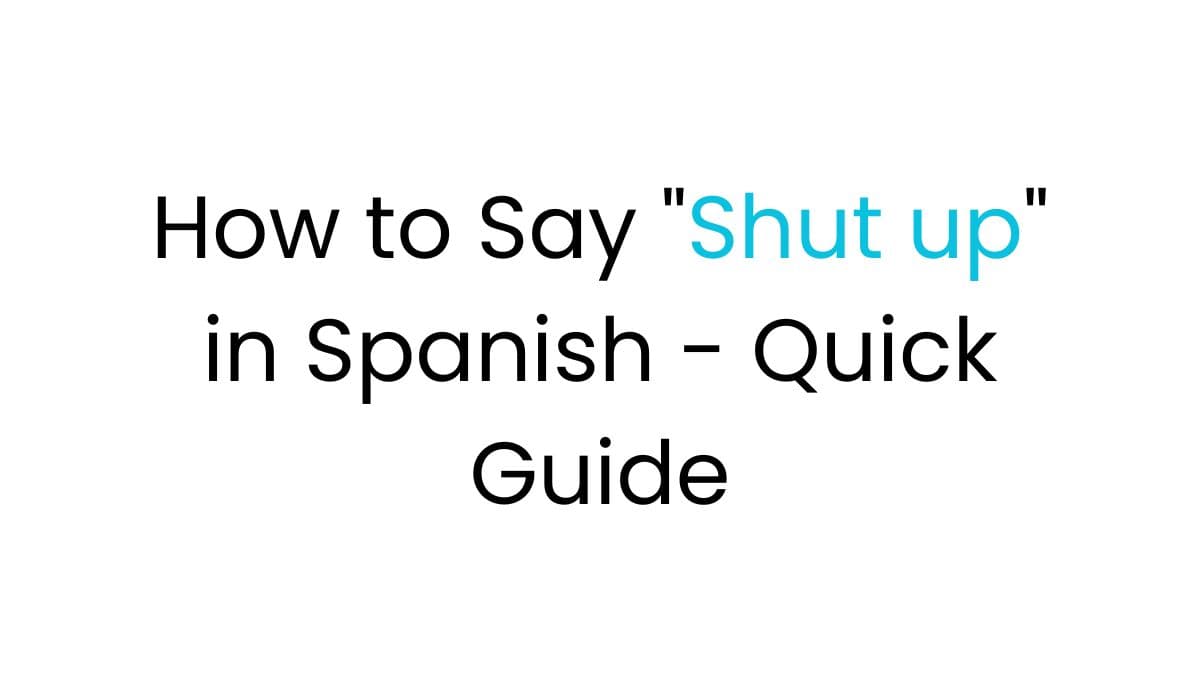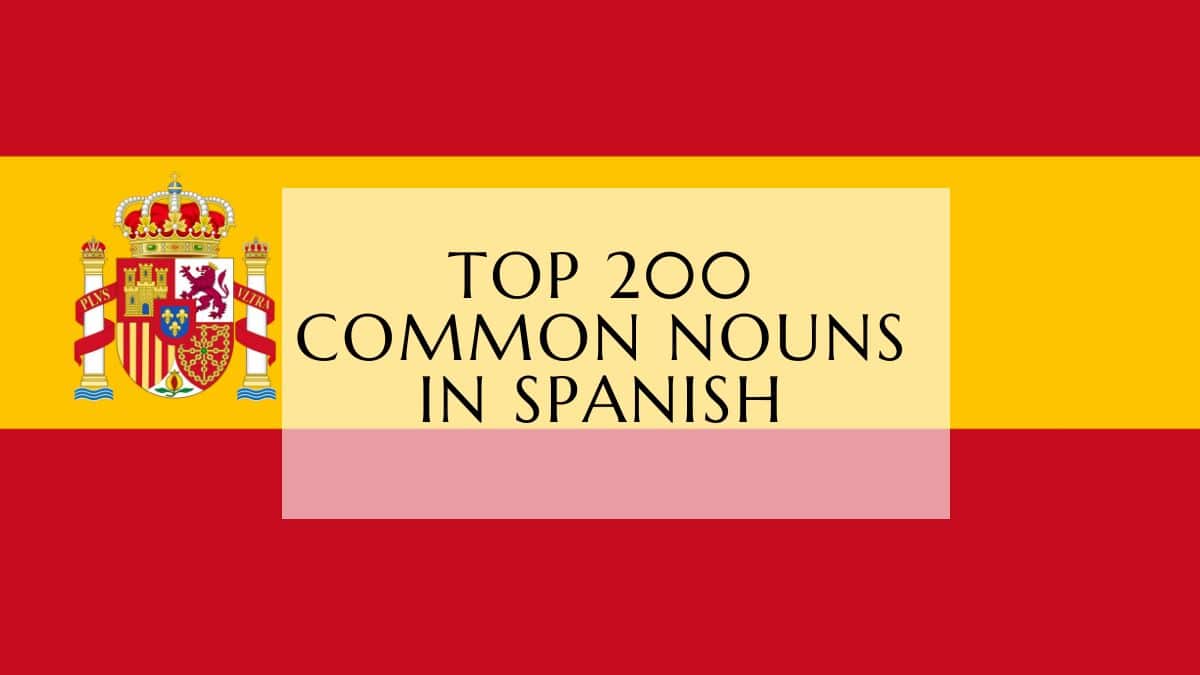Learning to say “shut up” in Spanish can be tricky. The language has many ways to express this idea. This guide will help you learn the right words and how to use them correctly in Spanish-speaking places.

We’ll look at phrases like “¡Cállate!” and “Guarda silencio.” These are different ways to say “shut up” in Spanish. We’ll talk about when to use them and how they sound. Knowing these phrases can make talking in Spanish easier and more respectful.
Different Ways to Say “Shut Up” in Spanish
¡Cállate!
The simplest way to say “shut up” in Spanish is “¡Cállate!” It comes from the verb “callarse,” which means “to shut up.” The way you say it changes based on who you’re talking to.
You can say:
- “¡Cállate!” (Informal, addressing one person)
- “¡Cállese!” (Formal, addressing one person)
- “¡Cállense!” (Formal, addressing a group)
These commands work in many situations, from casual chats to formal talks. They tell someone to quiet down directly.
| Expression | Meaning | Level of Politeness |
|---|---|---|
| “¿Puedes bajar la voz, por favor?” | A gentle way of asking someone to be quiet in Spanish. | Polite |
| “Baja la voz, por favor” | Keeping one’s voice down politely in Spanish. | Polite |
| “Guarda silencio” | Encouraging someone to be quiet in a non-aggressive manner. | Polite |
| “Haz silencio, por favor” | Requesting someone to be quiet with a level of assertiveness and politeness. | Polite |
| “¡Silencio, por favor!” | Formally asking a group of people to be quiet in Spanish. | Formal |
| “¡Shhh!” | Using the onomatopoeia “shhh” to request silence. | Informal |
| “¡Calla!” | A standard way of saying “shut up” in Spanish, giving an order to be silent. | Informal |
| “¡Muérdete la lengua!” | Encouraging someone to hold their tongue in informal situations. | Informal |
Polite Requests for Silence
When you need to be more polite, there are kind ways to ask for silence in Spanish. Instead of saying “pedir silencio” (shut up), you can ask nicely. Use phrases like “¿Puedes bajar la voz, por favor?” (Can you keep your voice down, please?) or “Guarda silencio” (Be quiet).
These solicitar silencio (polite requests for silence) work well in formal or professional situations. For instance, you might say “Haz silencio, por favor” (Be quiet, please) in a library or during a meeting.
- “¿Puedes bajar la voz, por favor?” (Can you keep your voice down, please?)
- “Guarda silencio” (Be quiet)
- “Haz silencio, por favor” (Be quiet, please)
These petición de silencio (requests for silence) are a polite way to pedir silencio (ask for silence). They help keep things respectful and cooperative.
“Guarda silencio” is a polite way to tell someone to be quiet in Spanish, akin to “be quiet” in English, used in formal contexts.
Shut Up In Spanish
In Spanish, telling someone to “shut up” can be done in many ways, from polite to direct. You can say “¡Cállate!” (Shut up!) for a strong message or “¿Puedes hacer silencio, por favor?” (Can you please be quiet?) for a polite request. This shows how the language offers many ways to ask for silence.
A famous phrase is “¿Por qué no te callas?” (Why don’t you shut up?), made popular by King Juan Carlos of Spain in 2007. It became a hit, with over 665,000 web searches and 500,000 ringtones sold, making €1.5 million.
Informal ways to say “shut up” include “Cierra la boca” (Shut your mouth), “Cierra el pico” (Shut your beak), and “Cállate la boca” (Shut your damn mouth). For a polite version, you could say “Guarda silencio” (Keep silent) or “Haz silencio, por favor” (Be quiet, please).
Slang terms like “Cállate la jeta” (Shut your trap) and “Cierra el pico” (Shut your beak) are used by some people, especially the young. If you’re really upset, you might say “¡Cierra la maldita boca!” (Shut your damn mouth!).
| Informal | Formal |
|---|---|
| ¡Cállate! (Shut up!) Cierra la boca (Shut your mouth) Cierra el pico (Shut your beak) Cállate la boca (Shut your damn mouth) Cállate la jeta (Shut your trap) | ¿Puedes hacer silencio, por favor? (Can you please be quiet?) Guarda silencio (Keep silent) Haz silencio, por favor (Be quiet, please) |
Emphasizing Silence
When you need to stress the importance of silence in Spanish, phrases like “¡Silencio!” (Silence!) and “¡Haz silencio!” (Keep quiet!) work well. These phrases are often used in formal places, like a classroom or a big event. They help ensure everyone stays quiet quickly and firmly.
The Spanish language has many ways to pedir silencio enfáticamente (request silence emphatically). You can say “¡Basta de ruido!” (Enough noise!) or “¡Por favor, guardar silencio!” (Please, keep silent!). These phrases show a strong need for silence.
Sometimes, you can also use nonverbal cues to stress the silencio en español (silence in Spanish). A serious look or a raised hand can help. Saying “¡Háblale a la mano!” (Talk to the hand!) with a hand gesture is another way to show you want complete ¡silencio!.
When it’s important to keep quiet, Spanish gives you many ways to pedir silencio enfáticamente (request silence emphatically). It makes it clear that silence is expected and needed.
Forceful Commands
When you need to be more direct to ask for silence, Spanish has comandos enérgicos (forceful commands). These frases contundentes para callar (forceful phrases to shut up) are strong and assertive. But, they should be used with care. They can be seen as expresiones enérgicas para pedir silencio en español (energetic expressions to request silence in Spanish) that are rude or aggressive.
¡Cállate! (Shut up!) is a direct way to tell someone to be quiet. It’s strong and clear, perfect for times when you really need callar con firmeza en español (to shut up firmly in Spanish).
- ¡Cierra la boca! (Shut your mouth!)
- ¡Cierra el pico! (Shut your trap!)
- ¡Calla! (Hush!)
These phrases are very authoritative. Use them when you really need to stop someone from being disruptive. This is especially true in situations where you can’t wait for them to be quiet, like in a crisis.
| Command | Translation | Tone | Appropriate Usage |
|---|---|---|---|
| ¡Cállate! | Shut up! | Firm, unyielding | Persistent disruptive behavior, critical situations requiring immediate silence |
| ¡Cierra la boca! | Shut your mouth! | Forceful, aggressive | Confrontational situations, dealing with defiant or rude individuals |
| ¡Cierra el pico! | Shut your trap! | Colloquial, confrontational | Informal settings, dealing with annoying or disruptive behavior |
| ¡Calla! | Hush! | Authoritative, commanding | Quieting a large group, demanding immediate silence |
Onomatopoeic Sounds
Spanish uses onomatopoeic sounds to ask for silence too. Words like “¡Shhh!” and “¡Chitón!” are often used to tell someone to quiet down. This is usually in casual or informal situations.
¡Shhh! or ¡Chitón!
These words are sonidos onomatopéyicos that mean pedir silencio, or asking for silence. “¡Shhh!” sounds like the quieting hiss, while “¡Chitón!” is a stronger way to tell someone to callar, or be quiet.
Spanish has many formas de hacer callar en español mediante sonidos. Onomatopoeic words cover a range of sounds, from animals to human actions. They’re a flexible way to ask for silence in various situations.
| Onomatopoeic Sound | Meaning in English |
|---|---|
| ¡Shhh! | Shh! (to indicate silence) |
| ¡Chitón! | Quiet! Shhh! |
| ¡Pssst! | Psst! (to get someone’s attention quietly) |
| ¡Zzzz… | Shh, sleeping/snoring sound |
These sonidos onomatopéyicos para pedir silencio en español are a handy and fun way to ask for quiet. They’re often more subtle or playful than just telling someone to be quiet.
Contextual Usage
Using “shut up” phrases in Spanish depends on the situation and the relationship between people. Formality, familiarity, and tone matter a lot. Knowing when to use these phrases is key to clear communication and avoiding confusion.
With close friends or family, saying “¡Cállate!” (Shut up!) is okay. But in formal or work settings, ask nicely with “¿Por favor, te puedes callar?” (Could you please be quiet?).
For frustration or disbelief, try “¿Por qué no te callas?” (Why don’t you shut up?). For fun, say “Cállate y sigue con tu trabajo” (Shut up and get back to work) or “Nunca pierdas una buena oportunidad de callarte” (Never miss a good opportunity to shut up).
Some sayings combine “shut up” with actions, like “Cállate. Si no, te echarán” (Shut up. If not, you’ll be thrown out) or “Cállate la boca. Hoy es mi día de descanso. Todo lo que quiero oír hoy es el canto de los pájaros” (Shut your mouth. Today is my day off. All I want to hear today is the song of the birds).
The way you use phrases like “shut up” matters a lot in Spanish. Knowing when to say “cállate” or “silencio” helps in talking well and building good relationships.
| Phrase | Frequency | Context |
|---|---|---|
| “¡Cállate!” | 19 | Casual, informal settings among close friends or family members |
| “¿Por favor, te puedes callar?” | 5 | Formal or professional situations |
| “¿Por qué no te callas?” | 1 | Expressing exasperation or disbelief |
| “Cállate y sigue con tu trabajo” | 1 | Lighthearted, humorous approach |
| “Cállate. Si no, te echarán” | 1 | Pairing the “shut up” phrase with an additional action or statement |
| “Cállate la boca. Hoy es mi día de descanso. Todo lo que quiero oír hoy es el canto de los pájaros” | 1 | Pairing the “shut up” phrase with an additional action or statement |
Cultural Considerations
When using consideraciones culturales para decir “cállate” en español, think about the cultural setting and what people expect. In some países hispanohablantes, saying certain things can be seen as very rude. The way you say it and your body language matter too. Knowing these cultural details helps you talk respectfully and effectively.
It’s key to understand normas culturales sobre pedir silencio en español. The right way to ask someone to be quiet changes a lot based on who you’re talking to and where you are. Choosing the right words and how you say them can turn a polite ask into something rude.
Also, expectativas culturales sobre el silencio en países hispanohablantes affect how “shut up” phrases are seen. In some places, being quiet is very important. In others, people like to talk more. Knowing these differences is important to make sure “shut up” phrases are understood correctly.
Oualid Cheddadi is the founder of Lingualid, a platform that inspires independent language learners worldwide, regardless of the language they are learning. The name “Lingualid” is derived from the Portuguese word for “language,” “língua,” and the last three letters of Oualid’s name, “Lid.”



